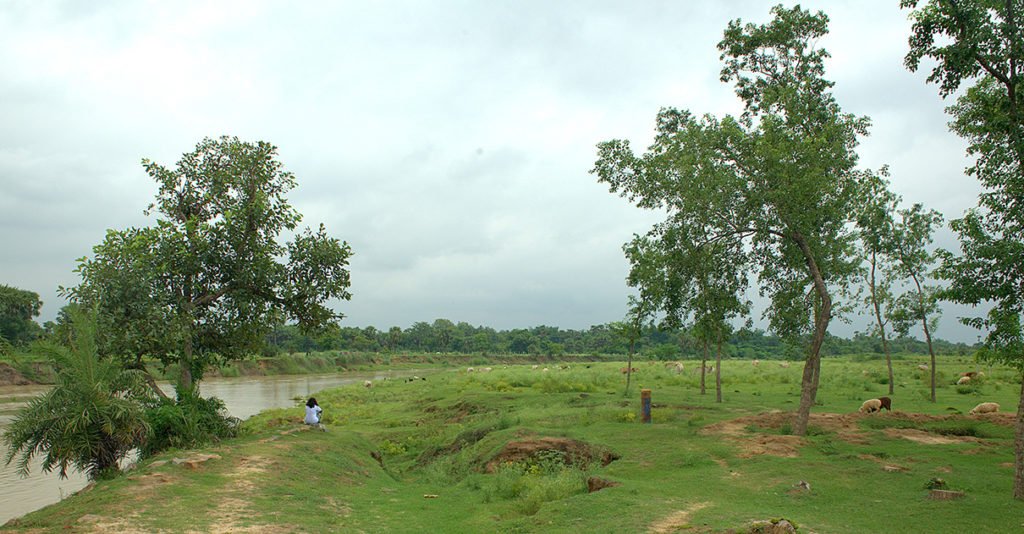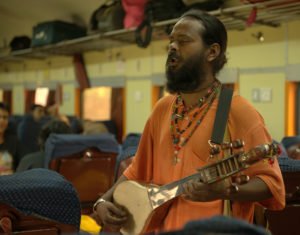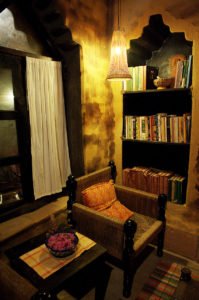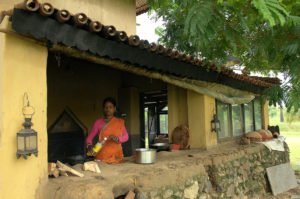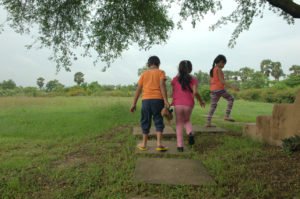Experiencing Ethnic Bengal at the Rare Earth Farms and Homestay, Shantiniketan, Bolpur
Train rides and villages of India bring with them a nostalgic feeling. Wanting to expose our children to both, but having limited time in hand, we went on an overnight trip to the Rare Earth Farms and Homestay, in the Santhal village of Bautijol, near Bolpur in Birbhum District.
Bookings were made through the city office in Hindusthan Road, Kolkata. Details of the booking facilities are also available online and on Facebook.
A 4-hour road trip (approx. 172 km) might have been easier as we were traveling with four city-bred children. However, the children were more enthusiastic about the 2 and 40 minutes’ train journey. So, Shantiniketan Express it was – from the grand old Howrah Station.
The Train Trip
The difference between a road trip and a train ride, through Bengal, is the wide variety of snacks and beverages which are sold by the hawkers who board the train from the local stations. The heady mix of aromas of the quintessentially Bengali jhaalmuri, shingara, vegetable chop, peanuts, jhaal lozenges along with lebu cha, tea and coffee, can make even the diehard diet-watcher surrender to temptation. The witty peddlers sell with an entertaining zest. From books, comics, newspapers to combs and safety pins – all are available on these journeys.
Outside the surprisingly clean windows, we could see the rain-washed green rice fields fringed by banana trees, coconut and date palms. The ponds filled with water and hyacinth, thatched huts and colourful brick houses with elaborate grills reflected the beauty of rural Bengal.
Trains to Bolpur, from Howrah and Sealdah stations, have a distinctive feature. Bolpur is the station that takes you to Rabindranath Tagore’s Vishwa Bharati University (Shantiniketan). The Bauls or Bengal’s wandering minstrels board the train a few stations before Bolpur and render mellifluous songs accompanied by their ektara or dotara. A Rabindrasangeet singer follows the baul and readies your mind for Kobiguru’s abode of peace.
The Earthy Experience
We were welcomed by the driver of our hired Mahindra jeep, with a bright smile. As we left the initial hustle-bustle of the areas near the station, we found ourselves on the roads of red earth, or in Tagore’s words, ‘ranga matir poth’. The 11.5 km ride from Bolpur’s Prantik station to the Rare Earth Farms and Homestay was pleasant.
We were dropped off at the gate of the homestay.
Before us lay the idyllic stretches of the resort where mustard, sesame, rice and an array of organic vegetables were grown. The traditional huts, made of indigenous materials, with terracotta roofs sourced from Jharkhand, were visible from the unpretentious gate.
The manager Arindum Chakraborty, a graduate from the vicinity, ushered us to the rustic rooms. There were five air-conditioned suites available on a twin-sharing basis. The bedrooms had all necessities, like electric kettles for tea or coffee and drinking water. Thankfully, there were no television sets. All rooms had clean attached toilets with hot and cold water. The walls and floors felt cool to touch due to the natural materials used. Books and CDs lined the niches in the walls that were damp in places. The dampness drew faces on the walls, rendering a mysterious look. Wooden doors, windows and furniture with vibrant handloom rugs and covers, terracotta and wooden handicrafts strategically strewn around the rooms and premises added to the ethnic ambience.
Air-conditioning was not necessary during monsoon but Birbhum summers are scorching. The best time to visit are spring and winter.
Arindum doubled up as the waiter and housekeeper. Room service and housekeeping needs were promptly catered to, including getting geckos out of the room.
By the time we settled in, we were famished. Piping hot food was ready at the common dining-cum-lounge area, overlooking a pond. Vegetarian and non-vegetarian lunch and dinner had to be paid for.
Kalomoni Mardi, a shy local tribal lady, cooked traditional Bengali dishes that were simple and nutritious, using organically grown ingredients from the farm. The only let down were the flies hovering around but then, most guests are not bothered, as flies are common in India.
While eating, we decided to visit the University premises later in the afternoon. Though Totos could be hired, we preferred to avail the services of the same vehicle that had picked us up from the station. We booked it for the next day too, till our station drop off.
Later, Arindum told us how the resort came into being.
The Building of Bonds
In 2011, restaurateurs Subrata and Sunetra Ghose Chaudhuri wanted a rural getaway, to plant trees and be one with nature. They built Rare Earth Farms on 15 acres of arable land, beside Bautijol, just 8 km from Shantiniketan and Vishwa Bharati University. It is conveniently located and easy to visit the area near River Khoai for the Saturday Haat (market for local handicrafts) of Shonajhuri, Lavpur, Joideb-Kenduli and Massanjore.
Keeping in mind the rustic atmosphere and Bengali architecture, the exteriors were designed and conceptualised by Bidyut Roy, an artist from Santiniketan.
Having an inclusive mind and being socially responsible, the Chaudhuris built this homestay with the help of the villagers of the adjoining tribal settlement, especially the ladies. The well thought out interiors with attention to details, speak volumes about the aesthetic sense of the owners. The proprietors themselves conceptualized the new cottages, kitchen and dining area.
The owners’ pet project, The Rare Earth Foundation, works dedicatedly towards the betterment of the locals.
- Children and youth are being involved in planting and protecting the flora and fauna of the farm and the village. The age-old tribal practice of killing small birds has now stopped
- Villagers are being taught to protect, identify and use local medicinal plants
- Proper sanitation facilities have been started for women
- Medical aid is given to the needy
- The tribal football team is supplied with football jerseys, boots and footballs
- A computer-training centre for the youth has been completed
- Creating job opportunities for a few families of the village through farming, animal husbandry, and hospitality service in the Homestay.
Rare Earth wants to create an oasis where there is peaceful co-existence of nature and Man.
The Ethnic Evening
In the evening, children came to the resort courtyard to study, as there was a steady supply of electricity. Regular tuition classes have been arranged for them.
After the classes, they chatted and sang accompanied by the sounds of silence – cicadas, crickets and frogs playing music in the background.
Once the children went home, a musical evening was arranged for, around a bonfire. As the clouds covered the moon, night fell over an intoxicating cocktail of sounds and sights – of the bauls’ songs with ektara, dugi and ghungroos; the sleek Santhal dancers moving rhythmically with the beats of madol and tirio; and ‘hnadiya’ – local rice wine. For a more authentic flavour, we could have visited the Santhal village and had the drinks with them but there were sleepy children with us.
Goodbye to Good Earth
The day after, was as beautiful as the night. The fresh air, chirping birds, humming bees and fluttering butterflies over vibrant flowers called out to the children to explore, while the complimentary breakfast got ready.
There were free facilities for cycling to the Santhal village and fishing; binoculars for bird watching, kites for flying. We were also welcomed to join in the daily farming activities.
However, time was running out. A visit to the Kankalitala Mandir and the River Kopai, before rushing to catch the train to Kolkata, had been planned. After a sumptuous breakfast of luchi, aloor torkari and sweets, we went off to pay homage to the legendary Shakti peeth of Kankalitala where the waist of Sati had fallen.
One and a half days did not do justice to the pastoral beauty of the place. True to its homestay status, the entire set up had an exclusive yet homely feel. It is, indeed, rare to find such holistic establishments in earthy Bengal.

